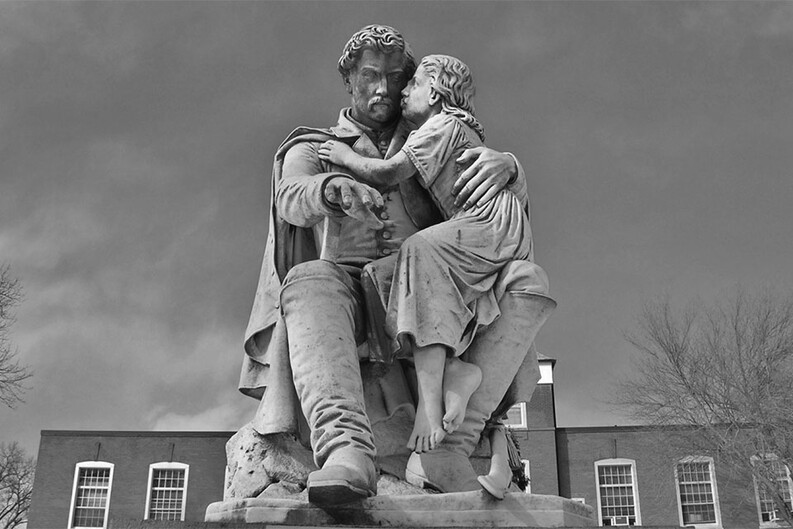Report Calls for Equal Treatment of Vets with Trauma, Bad Papers

On February 12, 2018, the Connecticut Chapter of Iraq and Afghanistan Veterans of America (IAVA-CT) released a report titled, "A Time to Heal: State Benefits for Connecticut Veterans with Bad Paper." The report details the need for legislation to ensure that all veterans suffering from service-connected mental health injuries receive proper support from state veterans' programs. IAVA-CT has presented a bill to the CT General Assembly's Committee on Veterans' Affairs that would create equal access to state benefits for veterans discharged from the U.S. military under Other-than-Honorable (OTH) conditions, and who experienced post-traumatic stress disorder (PTSD), traumatic brain injury, or sexual trauma during their service. Although these veterans experience significantly higher rates of suicide, substance abuse, and homelessness, Connecticut state law bars them from accessing vital benefits as they navigate the transition back to their communities.
The Veterans Legal Services Clinic at Yale Law School represents IAVA-CT in its state benefits advocacy for veterans with a less-than-Honorable discharge status, also known as "bad paper."
"In a military culture that still struggles to acknowledge the impact of combat on service members' mental health, it is all too easy for veterans with experiences of trauma to receive OTH discharges, which are non-punitive administrative discharges requiring little due process that can be issued for relatively minor misconduct," explained Steve Kennedy, a team leader for IAVA-CT. "The behaviors most associated with OTH discharges such as self-medicating with drugs or alcohol and missing training exercises often stem from PTSD, traumatic brain injuries, or sexual assault. These veterans volunteered to serve, often knowing that they would see combat. They suffered as a result, and the very symptoms of their mental health injuries have precluded them from receiving the proper treatment for these same service-connected injuries."
Kennedy, an Army veteran, continued, "Regardless of their need, these veterans can't get treatment for addiction and mental illness at the state-run hospital and veterans' home at Rocky Hill, tuition waivers for in-state colleges, or funeral and burial assistance, in addition to other critical benefits and services that aid veterans' transitions back into their communities."
Conley Monk, Director of the National Veterans Council for Legal Redress (NVCLR), a Connecticut-based legal and advocacy organization, received an OTH discharge after serving in Vietnam, where he developed PTSD. Monk - who won his discharge upgrade in 2015 after years of delay by the Department of Defense - emphasized the significant toll that the denial of benefits takes on his fellow veterans. "When they come home, these vets who have experienced significant trauma while serving our country are told that they are ineligible for basic benefits. As a result, they feel stigmatized not only within the veteran community, but by the broader public as well," he said.
"Many of our constituents are living this nightmarish reality," said Garry Monk, NVCLR's Executive Director. "My brother Conley and myself started this conversation many years ago. It is now that the merit of these veterans' service should be honored and their invisible wounds be healed."
PTSD was not recognized as a condition until 1980, well after the Vietnam generation was discharged. Pattie Dumin, President of the Vietnam Veterans of America Connecticut State Council, said, "It was a tragedy then, and it is a tragedy now that 62% of less than honorably discharged veterans of Iraq and Afghanistan have PTSD, a traumatic brain injury, or a similar condition. We can't let the mistakes of the Vietnam generation play out again in the current generation."
The report estimates that there are approximately 800 veterans with OTH discharges in Connecticut who suffer from PTSD or a traumatic brain injury attributable to trauma from the time they served, or who were sexually assaulted while serving. This is just 0.4% of the total state veteran population, but it is precisely the population that may be most in need of these vital benefits.
Margaret Middleton, Executive Director of the Connecticut Veterans Legal Center, explained, "Access to mental health services is particularly crucial. These veterans, who are often survivors of combat or sexual assault, deserve our care, compassion, and respect no matter how a commanding officer characterized their service."
With regard to the bill proposed in the report, Kennedy said, "The Connecticut General Assembly has a unique opportunity to make these veterans whole by simultaneously recognizing their service and fulfilling our promise to care for them in the face of trauma and related challenges. At a time when Connecticut is hemorrhaging young people, we are unjustly leaving a group with proven commitment to service and valuable skills out in the cold. Made whole, these veterans can be leaders in our communities and in the state. It's time we help them lay the foundation for their own futures here in Connecticut."
The report is available to download online.
IAVA's mission is to connect, unite and empower post-9/11 veterans. Founded and led by veterans, IAVA is the modern-day veterans' hall for the current generation with over 400,000 members worldwide. IAVA is a non-partisan member advised advocacy organization focused on solutions to the issues facing veterans today. IAVA-CT carries out this mission in the state of Connecticut, led by and advocating for Connecticut post-9/11 veterans.
The Veterans Legal Services Clinic was founded in 2010 to train law students and to serve the legal needs of veterans. Under the supervision of clinical professors, clinic students engage in litigation before administrative agencies and courts on a range of matters.


